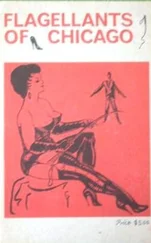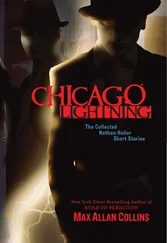“Is this an official interrogation?”
“I’d like to know.”
“You don’t have the right.”
She was speaking in a hostile tone and at the same time avoiding looking at his face. He threw his stout body into the chair and took a few moments to light his pipe and exhale a thick cloud of smoke. Then he said calmly, “Carol, I am the last person on earth who seeks to possess the woman he loves. But I think, inasmuch as we live together, it is only natural for each of us to know where the other is going.”
“I am not going to ask for your written permission to go out,” she cried, apparently determined to escalate the disagreement as far as it would go. She was carrying the Sunday Chicago Tribune and in sheer anger threw it down and its many pages scattered all over the floor. She shouted, “This is unbearable!”
She started to rush out of the room but just one step away from the door she stopped suddenly, frozen in place. She didn’t go out and didn’t turn back toward him, as if she had responded to that established mysterious rhythm that grew between people who had been married for a long time. She just stood there, as if waiting for him or summoning him. He got the signal: he rushed toward her and embraced her from the back, then turned her around and hugged her, whispering, “Carol, what’s the matter?”
She didn’t answer. He started kissing her passionately until he felt her body soften little by little as if opening up before him. He led her gently toward the bed, but he felt her tears wetting his face and he asked her in alarm, “What happened?”
She moved away from him and sat on the edge of the bed. She was exerting an extraordinary effort to control herself but finally collapsed and began to sob uncontrollably. Speaking in a disjointed manner, she said, “I went to a job interview. I told myself I’d tell you only if I get the job. You’ve had enough disappointment on my account.”
He raised her hands and began kissing them. Her mellow voice reverberated, as if coming from the depths of sadness. “I can’t take this anymore. With all my experience, what more do I need to prove to get a job.”
A profound silence descended upon them. Then she whispered as she buried her head in his chest and succumbed to a new fit of crying, “Oh, John, I feel so humiliated.”
The reverence with which Professor Dennis Baker is regarded could be attributed to various reasons: his strong personality, his integrity, his devotion to science, the way he treats his students and colleagues lovingly and fairly, his simple austere appearance, and his constant silence, which he only breaks to say something necessary and useful. But more important than all of that: his scientific achievements. Baker presents himself as a “photographer of cells,” words that encapsulate the hard work and effort that he has exerted over the past forty years to transform the photographing of cells from a mere ancillary method in scientific research into an established independent science that had its own tools and rules. Baker invented methods and techniques in photographing cells that were patented in his name. He published so many papers over the years that including his CV in the program of scientific conferences posed a real problem because it required several times as much space as any other professor’s CV. It has become impossible for any book on histology to be published in any university in the world without using Baker’s cell photograph collections. Professor Baker approached his work in the spirit of an artist. First, a mysterious thought would come to him; then it would persist and give him sleepless nights; then it would disappear, leaving behind an amazing, but fragile, idea. He would examine that idea and scrutinize it until it took hold in his mind. Then he would spend weeks testing the cells in different light settings and different levels of microscope strength. Finally, inspiration would come, revealing for him what he should do, whereupon he would enthusiastically rush to photograph, record, and print.
In addition to his scientific achievement, Baker is considered one of the greatest lecturers that the University of Illinois has known throughout its history. His lectures about bodily tissues were as simple as they were profound. This led the university administration to market them on CDs that sold thousands of copies. Despite the magnificence of his achievement, Baker, like many great creative minds, was not immune to fears of failure and apprehensions of falling short. There were dark thoughts that sometimes made him wonder about the value of what he did. Those who worked with him were quite familiar with the anxiety that came over him before his lectures, like stage fright. As soon as the lecture ended he would ask one of his assistants, “Don’t you think that my explanation was somewhat vague?”
If the assistant did not hurry to refute the accusation enthusiastically, Baker’s imagined shortcoming would be confirmed for him and he would shake his head and say sadly, “Next time I’ll try to do better.”
In Chicago’s bitter cold and snowy winter, old Professor Baker often got up at four o’clock in the morning, washed up, put on heavy clothes and gloves, and covered his head and ears well, as if he were a soldier going to the battlefield. He would take the 5:00 a.m. train with cleaning crews and drunkards from the previous night. He would go through this trouble gladly to be able to check the cell samples at the exact time that he had set to the minute. That was how Baker accomplished his glorious achievements day after day, with the perseverance of an ant and the devotion of a monk, until he became a legend. There was a lot of talk at Illinois for years about the likelihood of his getting a Nobel Prize at any moment.
John Graham, during one of his outspoken moments, commented on Baker’s achievement by saying, “The great Western civilization was made by unique and devoted scientists like Dennis Baker, but the capitalist system has turned their creative endeavor into production machines and commercial enterprises from which millions of dollars pour in to stupid and corrupt men like George Bush and Dick Cheney.”
Baker supervised dozens of MSs and PhDs, and among his students were many Egyptians who achieved dazzling results. He kept in his lab thank-you letters from them, which he always asked them to write in Arabic because he liked the shape of the letters. His positive experience with Egyptians made him curious about their country, so he borrowed several books about Egypt from the university library. One time he was invited with some professors to a reception at De Paul University. There he drank two glasses of whiskey (the limit that he allowed himself). The liquor loosened his tongue and released inside him a torrent of sympathy. He looked at Dr. Salah, who was standing next to him, and asked him in his usual, direct manner, “Dr. Salah, I have a question: all the Egyptians who’ve worked with me were talented and exceptionally hardworking and yet Egypt, as a country, is still scientifically backward. Do you have an explanation for that?”
Salah answered quickly, as if he had prepared the answer. “Egypt is backward because of the lack of democracy, no more and no less. Talented Egyptians achieve great results when they emigrate to the West; but in Egypt, unfortunately, the despotic regime usually persecutes them and passes them over.”
Baker looked at him for a moment then nodded and said, “I get it.”
This deep appreciation by the great scientist for Egyptians made him always amenable to being the advisor for their theses and dissertations. It must be mentioned here that Baker, the pious, observant Protestant Christian, did not see any differences among the races and ethnic groups. In his creed humans were all children of God, equally blessed with His sacred spirit. Thus we are able to understand his tolerant, liberal positions in departmental meetings: he evaluated each student according to his or her effort and abilities only, in total disregard for their nationality or the color of their skin (unlike George Roberts). These great ideals in which Dr. Baker believed were recently put to a difficult test. He had welcomed supervising Ahmad Danana for the PhD, but from the first instant, he noticed that Danana was a type of Egyptian that he hadn’t seen before: he was older, looked formal, and wore a full suit and a necktie. Baker did not dwell on Danana’s appearance, but the problem started with the first course, in which Baker taught his students methods of research. It was an important course because it introduced students to the basic principles they had to follow in their theses. Passing that course depended on class participation rather than on a traditional final examination. So Baker assigned students certain papers that they had to read, summarize, and comment on every week. Then he would listen to them and engage them in discussion and give them grades based on their absorption of the material and the amount of work they had put into it. Since the first class meeting Baker noticed, somewhat anxiously, that Ahmad Danana spoke on matters not germane to the subject at hand. He attributed that, perhaps, to the possibility that he did not understand what was required of him. So he summoned him to his office after class and gave him a new research paper, saying gently, “Read this paper well. Next week, in class, I’ll ask you to summarize it and comment on it.”
Читать дальше
Конец ознакомительного отрывка
Купить книгу












